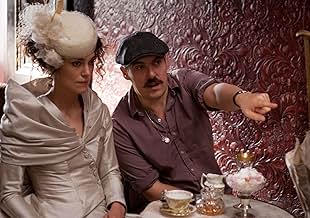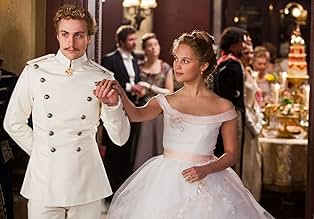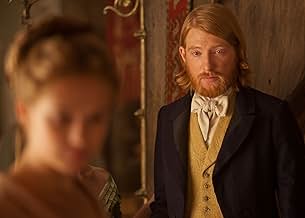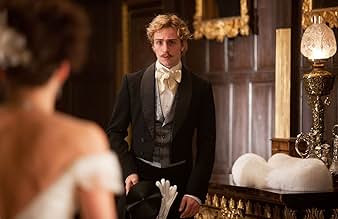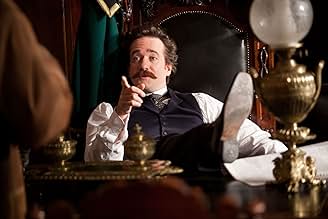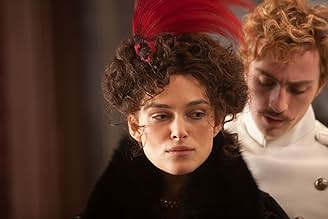A finales del siglo 19 en la alta sociedad de San Petersburgo, la aristócrata Anna Karerina da pie a una aventura con el encantador conde Alexei Vronsky.A finales del siglo 19 en la alta sociedad de San Petersburgo, la aristócrata Anna Karerina da pie a una aventura con el encantador conde Alexei Vronsky.A finales del siglo 19 en la alta sociedad de San Petersburgo, la aristócrata Anna Karerina da pie a una aventura con el encantador conde Alexei Vronsky.
- Dirección
- Guionistas
- Elenco
- Ganó 1 premio Óscar
- 33 premios ganados y 54 nominaciones en total
- Dirección
- Guionistas
- Todo el elenco y el equipo
- Producción, taquilla y más en IMDbPro
Opiniones destacadas
It took me about an hour to stop being irritated by the movie's self consciousness, to sort of enjoy it... but the damage was done.
As viewers, we have no reason to believe in the love Anna finds. He is creepy and give us no inkling of why she might ruin her life for him.
Kiera isn't bad, just annoying, considering we have no empathy for her self indulgence. If her husband was worse, her love a lot nicer, and if we could feel electricity between them, it would be a different matter, but the fact is the movie is too busy being clever... it misses out on having a heart and soul.
The theatre gimmick got in the way, and seemed like a cheap way of having Moscow backdrops without actually traveling there.
5/10
As viewers, we have no reason to believe in the love Anna finds. He is creepy and give us no inkling of why she might ruin her life for him.
Kiera isn't bad, just annoying, considering we have no empathy for her self indulgence. If her husband was worse, her love a lot nicer, and if we could feel electricity between them, it would be a different matter, but the fact is the movie is too busy being clever... it misses out on having a heart and soul.
The theatre gimmick got in the way, and seemed like a cheap way of having Moscow backdrops without actually traveling there.
5/10
I once asked Dustin Hoffman if he had any favorite movies or actors. He replied that he had favorite performances. Referring it seemed, to much smaller periods within a film. There are several shots where Keira is picture perfect, but this role was not for her. This performance ruins our memory of her former success under Joe Wright. Especially her first, which is her most unforgettable. Black Swan did the same for Natalie Portman, another of our cinema sweethearts. Which I walked out of.
Her part here needed to be much deeper and more complex, but instead it was shallow and trite. The way Anna was portrayed was out of place. Whether by acting or writing I don't know. Either way it was a mistake. All of the male leads, four at my count, complemented each other perfectly and were well done. Some surprising cameos among the women.
I didn't see it at the theater after hearing about the stage within the movie technique, which has actually been done in a few good movies. I didn't see it as a problem. The recent film Anonymous about Shakespeare began this way, as do others based on plays of his. Julie Taymore in her solo attempt to put Titus on film blended styles while injecting modern means and mechanism into near ancient settings, and pulled it off very smartly. Both of these were good films and highly worth watching. I point this out as there were many complaints about it in other reviews.
It isn't the blending of the modern and the ancient, or the use of multiple styles in itself that is a problem. It's more a question of whether it works, and how well it was done. I believe here it does. Peter Greenaway excels at this kind of film making. We sometimes forget how shallow we have become as a society. What a melange and patchwork our culture is. Are we surprised it shows up in our films.
There are some moments of clarity in the movie that are almost bewitching. While others present motion picture as painting or poetry. Some very good transitions. Overall I believe it to be a very creative effort. It is a blending of choreography, stage, and cinema with a desire to please the eye and entertain our emotions. It was only the moral ambiguity and modern sensibilities between the two lovers I found contemptible. Both of them being out of time and out of place.
Love is the great conquerer of lust. As lust is the great destroyer of love. I believe the author intended this to be about the second. It is a mistake to think movies from books should be the book. Just as it is wrong for an amoral people to replace the beliefs of a moral people . . with their own. Especially when borrowing or telling their stories. One of the great enjoyments for all lovers of period pieces is going back to a time when people knew morality and understood what it was, and most agreed with it. Whether or not they actually were moral is entirely . . another story.
http://fullgrownministry.wordpress.com/2013/08/04/covet/
Her part here needed to be much deeper and more complex, but instead it was shallow and trite. The way Anna was portrayed was out of place. Whether by acting or writing I don't know. Either way it was a mistake. All of the male leads, four at my count, complemented each other perfectly and were well done. Some surprising cameos among the women.
I didn't see it at the theater after hearing about the stage within the movie technique, which has actually been done in a few good movies. I didn't see it as a problem. The recent film Anonymous about Shakespeare began this way, as do others based on plays of his. Julie Taymore in her solo attempt to put Titus on film blended styles while injecting modern means and mechanism into near ancient settings, and pulled it off very smartly. Both of these were good films and highly worth watching. I point this out as there were many complaints about it in other reviews.
It isn't the blending of the modern and the ancient, or the use of multiple styles in itself that is a problem. It's more a question of whether it works, and how well it was done. I believe here it does. Peter Greenaway excels at this kind of film making. We sometimes forget how shallow we have become as a society. What a melange and patchwork our culture is. Are we surprised it shows up in our films.
There are some moments of clarity in the movie that are almost bewitching. While others present motion picture as painting or poetry. Some very good transitions. Overall I believe it to be a very creative effort. It is a blending of choreography, stage, and cinema with a desire to please the eye and entertain our emotions. It was only the moral ambiguity and modern sensibilities between the two lovers I found contemptible. Both of them being out of time and out of place.
Love is the great conquerer of lust. As lust is the great destroyer of love. I believe the author intended this to be about the second. It is a mistake to think movies from books should be the book. Just as it is wrong for an amoral people to replace the beliefs of a moral people . . with their own. Especially when borrowing or telling their stories. One of the great enjoyments for all lovers of period pieces is going back to a time when people knew morality and understood what it was, and most agreed with it. Whether or not they actually were moral is entirely . . another story.
http://fullgrownministry.wordpress.com/2013/08/04/covet/
Good production but doesn't quite hit the spot.
Set in 19th century Russia, a married aristocrat, Anna Karenina (played by Keira Knightley), starts an affair with a Count. After a while, the relationship becomes quite serious...
A decent adaptation of the Tolstoy novel. Lavish costumes and sets, and a sense of the emptiness and superficiality of Russian aristocracy. However, for all its intrigues, just doesn't quite hit the spot. Not entirely engaging and seems to drag in segments. Some of the imagery was just to clever for its own good, ending up feeling pretentious.
Solid performances all round. Jude Law is the best of the lot, as the conservative husband of Anna Karenina.
Set in 19th century Russia, a married aristocrat, Anna Karenina (played by Keira Knightley), starts an affair with a Count. After a while, the relationship becomes quite serious...
A decent adaptation of the Tolstoy novel. Lavish costumes and sets, and a sense of the emptiness and superficiality of Russian aristocracy. However, for all its intrigues, just doesn't quite hit the spot. Not entirely engaging and seems to drag in segments. Some of the imagery was just to clever for its own good, ending up feeling pretentious.
Solid performances all round. Jude Law is the best of the lot, as the conservative husband of Anna Karenina.
The lead virtue - Jude Law as Karenin. The worst sin - the mixture of pieces from everywhere for create the atmosphere. The theater is a nice idea but only better used . Virtues - the portraits of Levin and Kitty. Problems - a not reasonable Vronski and imposibility to feel the drama of Karenina. Short. It is a film without soul. Images, inacuracy, a kitsch Russia and a sort of "ad usum Delphini" adaptation. Too noisy, too vulgar, using the not inspired actor for Vronsky and proposing a hard fight to Keira Knightley for create her Karenina. Short, a film without purpose. And that is all.
I adore the novel, so I will be discussing Joe Wright's take on it and where it ranks amongst other adaptations but I will of course look at its merits as a film aside from the novel.
As a whole adaptation, this version falls somewhere in the middle. Even without all the metatheatrical trappings, it still took an interesting and valid approach to the novel, proving that the novel could be adapted until infinity and it would still be fresh each time. As readers of the novel would know, there is much more to it than Anna's affair. Tolstoy did not write vague types: he wrote fully-fleshed characters, and Tom Stoppard's screenplay acknowledged Tolstoy's style. Therefore I don't want to condemn the film outright because that would overshadow the things that it does get right.
Keira Knightley's version of Anna is not nearly as bad as you would think. She has the sense to restrain herself a little so that the many other elements of the novel shine through. She goes for the unsympathetic approach and it works. All her mannerisms that I generally find annoying- the schoolgirl smirking and rampant nymphomania- actually work for this role. This Anna takes Vronsky just because she can, and then ultimately regrets it. We can feel her frustration: she's young and wants to have fun but she's tied down to a stuffy older husband. In that sense, it's quite a modern interpretation, but not hideously so.
Aaron Taylor-Johnson as Count Vronsky was just miscast. If the novel had been about Anna seducing a schoolboy, he would have been great, but Vronsky is meant to be a dashing man. The styling is atrocious- he looks like a seventies Scandinavian Eurovision entry. Wright seems to have told some of the actors to act realistic and some to play up to the stylised setting. Taylor-Johnson plays the artifice so much that he just comes off as camp and sleazy. The scene where he is about to ride Frou Frou is like a production of Equus and there's a love scene with Keira Knightley that brought to mind an old advert for Philadelphia cheese. Their revelation of love is also poorly dealt with. Anna has some kind of fantasy dream where the two have an "erotic ballet" and suddenly they're banging away, presumably now in the real world.
Jude Law as Karenin. A bizarre choice when he could have played Vronsky five years ago and might even get away with it now at a push. However, he gives a performance that is probably his best. His Karenin is a bureaucrat through and through. Other adaptations have still made Karenin an attractive option. This Karenin is certainly not going to develop any great passion soon. We also see how he is manipulated by moral guardian Countess Lydia. If Law is trying to make a reputation as a serious actor, he's on the right path.
And what about all that pretentious theatre stuff? It seriously slows down the pace in the first third but once you get used to it, you can just enjoy the film. The ending is rather abrupt (no, that famous ending is not the last scene) but quite poignant.
As a whole adaptation, this version falls somewhere in the middle. Even without all the metatheatrical trappings, it still took an interesting and valid approach to the novel, proving that the novel could be adapted until infinity and it would still be fresh each time. As readers of the novel would know, there is much more to it than Anna's affair. Tolstoy did not write vague types: he wrote fully-fleshed characters, and Tom Stoppard's screenplay acknowledged Tolstoy's style. Therefore I don't want to condemn the film outright because that would overshadow the things that it does get right.
Keira Knightley's version of Anna is not nearly as bad as you would think. She has the sense to restrain herself a little so that the many other elements of the novel shine through. She goes for the unsympathetic approach and it works. All her mannerisms that I generally find annoying- the schoolgirl smirking and rampant nymphomania- actually work for this role. This Anna takes Vronsky just because she can, and then ultimately regrets it. We can feel her frustration: she's young and wants to have fun but she's tied down to a stuffy older husband. In that sense, it's quite a modern interpretation, but not hideously so.
Aaron Taylor-Johnson as Count Vronsky was just miscast. If the novel had been about Anna seducing a schoolboy, he would have been great, but Vronsky is meant to be a dashing man. The styling is atrocious- he looks like a seventies Scandinavian Eurovision entry. Wright seems to have told some of the actors to act realistic and some to play up to the stylised setting. Taylor-Johnson plays the artifice so much that he just comes off as camp and sleazy. The scene where he is about to ride Frou Frou is like a production of Equus and there's a love scene with Keira Knightley that brought to mind an old advert for Philadelphia cheese. Their revelation of love is also poorly dealt with. Anna has some kind of fantasy dream where the two have an "erotic ballet" and suddenly they're banging away, presumably now in the real world.
Jude Law as Karenin. A bizarre choice when he could have played Vronsky five years ago and might even get away with it now at a push. However, he gives a performance that is probably his best. His Karenin is a bureaucrat through and through. Other adaptations have still made Karenin an attractive option. This Karenin is certainly not going to develop any great passion soon. We also see how he is manipulated by moral guardian Countess Lydia. If Law is trying to make a reputation as a serious actor, he's on the right path.
And what about all that pretentious theatre stuff? It seriously slows down the pace in the first third but once you get used to it, you can just enjoy the film. The ending is rather abrupt (no, that famous ending is not the last scene) but quite poignant.
¿Sabías que…?
- TriviaOne of Alicia Vikander's favorite experiences from the production was the filming that took place in the countryside outside of St. Petersburg, Russia. The temperatures dropped below -40 °C, and she stayed in a cabin for five days that didn't have hot water and only featured benches instead of beds. Meanwhile, Russian security guards protected her and co-star 'Domhnall Gleeson' from wild wolves and bears that dominated the deserted area.
- ErroresThe label of the bottle of morphine Anna drinks from changes from "la Morphine" to "Morphine" between shots. The only correct French form would be without an article (prescriptions would have been written in Latin in 19th-century Russia anyway).
- ConexionesFeatured in Projector: Anna Karenina (2012)
- Bandas sonorasSong for a New Life (Masha's Song)
(uncredited)
Written by Anoushka Shankar
Performed by Tannishtha Chatterjee
Selecciones populares
Inicia sesión para calificar y agrega a la lista de videos para obtener recomendaciones personalizadas
- How long is Anna Karenina?Con tecnología de Alexa
Detalles
- Fecha de lanzamiento
- Países de origen
- Sitio oficial
- Idioma
- También se conoce como
- Chuyện Tình Anna
- Locaciones de filmación
- Kizhi, Karelia, Rusia(on location)
- Productoras
- Ver más créditos de la compañía en IMDbPro
Taquilla
- Presupuesto
- USD 40,600,000 (estimado)
- Total en EE. UU. y Canadá
- USD 12,816,367
- Fin de semana de estreno en EE. UU. y Canadá
- USD 320,690
- 18 nov 2012
- Total a nivel mundial
- USD 68,929,150
- Tiempo de ejecución2 horas 9 minutos
- Color
- Mezcla de sonido
- Relación de aspecto
- 2.35 : 1
Contribuir a esta página
Sugiere una edición o agrega el contenido que falta

Principales brechas de datos
What is the streaming release date of Anna Karenina (2012) in Canada?
Responda






